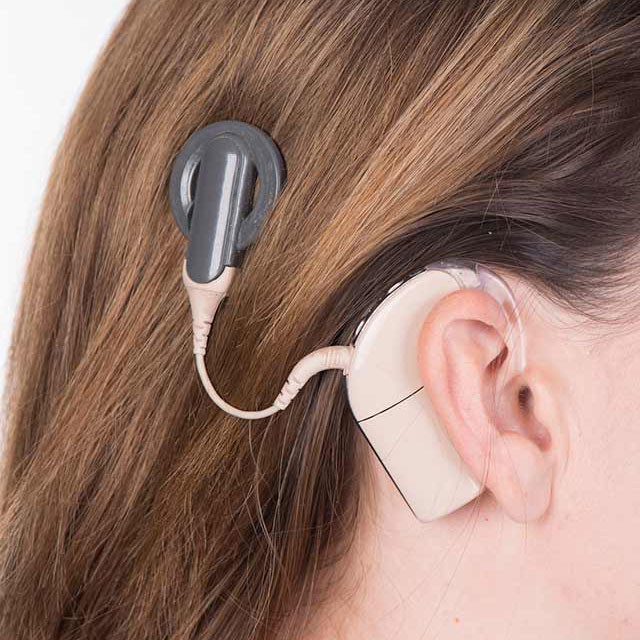This week we’re celebrating #DeafAwarenessWeek.
Our incredible Business Analyst Georgina Daugherty took the time to write a piece, which not only discusses her own experience (#MyDeafStory), but provides professional advice and resources which can help all of us to communicate and empathise with each other better. #BeDeafAware
#MyDeafStory
I was born profoundly deaf in both ears and hear only with the aid of a Cochlear Implant in my right ear. I was one of the first people to receive a cochlear implant, in September 1996 – when I was around two and a half years old. Medical professionals weren’t sure how long this new technology would last, or whether it would work at all, but 25 years later it’s still working for me and has had a profound impact on my life.
Cochlear implants work in two parts; the internal device which I received in September 1996 and the external device which I first received in October 1996, and have had updated throughout the years – when I was younger I had a big external device, accompanied by a battery pack so large I had to wear a vest to carry it! Now, thanks to technological advances, it looks like a hearing aid and fits snugly behind my ear.
Thanks to the cochlear implant, I can communicate like a “hearing person”. My disability is both hidden and sometimes visible (if you notice my cochlear implant when my hair is up for example). You might not realise that I am deaf because I communicate like a “hearing person” but hearing through a cochlear implant differs from normal hearing and takes time and effort to learn/relearn. I don’t solely rely upon the implant (which isn’t 100% effective), I also utilise social cues like lipreading and body language.
I am very passionate about disability awareness and education, both for people living with disabilities and those who don’t. Hearing loss affects 12 million people in the UK and approximately 466 million people globally; imagine what an overwhelmingly positive impact it would have on the Deaf community if more people took the time to learn about disabilities, and perhaps even learnt some sign language!
The workplace from my perspective as a deaf person
The stigma around hiring a disabled person is real. I have personally faced this discrimination many times. I think one of the most common misconceptions is that if you are disabled you are not capable of being an active, competent member of the workforce, forgetting that disability is a spectrum and no two people are affected in the exact same way. It should go without saying (but I’ll say it anyway!) that there are many people who can, and do work in many different sectors and industries, despite their disability.
In my experience, I have learnt that raising disability awareness breaks down perceptions and barriers that I have faced throughout my life. Once someone takes the time to understand what it’s like to be in my shoes, it does make a huge difference. Isn’t empathy wonderful! At DPAS, I haven’t encountered the discrimination that I’ve faced in other workforces, it is brilliant to feel true equality and diversity in our workplace.
The key tip that I’ve learnt over the years is to be transparent about my deafness and to notify my workplace about my communication preferences and what works for me, from the beginning. From a social perspective, it’s also helpful to make people aware that I am deaf, so they don’t think I’m being rude if I don’t hear them or my implant isn’t always working as well as it should – technology, like people, has its off days!
Another thing I have also learnt is to tell people that my ability to hear depends on batteries, which at some point throughout the day may run out. I have gotten very good at still carrying on a conversation while changing my batteries as I can lip-read.
Top tips on how to communicate with deaf people
- Instead of shouting or raising your voice to get our attention, wave or stand in front of a deaf person and make eye contact. Shouting can be very uncomfortable for hearing aid and cochlear implant users and in some cases can cause distress.
- Don’t speak very slowly or exaggerate your mouth movements – this does not help and can feel belittling.
- Don’t have a conversation while your eyes are wandering off or turning your back on deaf people. Please maintain eye contact and face us when you are speaking. Don’t be afraid to use gestures and facial expressions to help explain yourself.
- When a person doesn’t understand you (applies to everyone!) please don’t say ‘never mind’ and dismiss them, instead use the notes section on an iPhone or compose a text message as another way to communicate. Or, if you don’t have a phone at hand, use pen and paper!
- Please don’t use voice notes to communicate with deaf people. It is hard work trying to figure out what has been said and often we miss things. Preferably send a text or an email!
As a side note, if a deaf person communicates through sign language it is a great tip to learn some basic signs to help them feel at ease, or book an interpreter if you have the resources to do so.
The RNID also has a tool (https://rnid.org.uk/get-involved/create-a-personalised-digital-communication-card/) where you can create your own communication card to let people know your unique communication needs (this doesn’t just apply to deaf people!).
Some films and resources:
- CODA (Oscar-winning film) which is currently streaming on Apple TV
- ‘Sound of Metal’ starring Riz Ahmed which is currently streaming on Amazon Prime
- Did you know that you can get a disabled railcard for a 1/3rd off travel if you qualify as having a disability?
- Did you know that you can turn on subtitles or closed captioning on MS Teams? This is something that would be helpful for hard of hearing or deaf colleagues.
- Know your rights! Some useful resources are the Equality Act 2010 and the United Nations Convention on Disability Rights
- The Government has also set up a dedicated Disability Unit. On the GOV.UK website you can find a plethora of resources in a variety of different mediums. Additionally, if you would like to share your experiences with your disability you can send 250 words to ducitizen- space@cabinetoffice.gov.uk
- Please see the RNID (https://rnid.org.uk/ ) and the UK Council on deafness (https://ukcod.org/) websites for some more useful resources.
We have a range of articles catered towards equality and understanding in the workplace, such as Bisexuality Awareness Day and Compassion in the Workplace, if you would like to develop your understanding of peers in the workplace further.










